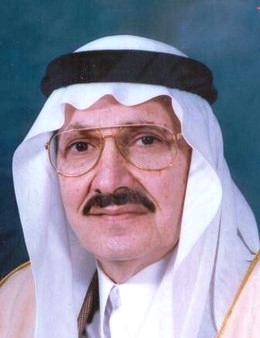Talal of Saudi Arabia
| Talal | |||||
|---|---|---|---|---|---|
| Custodian of the Two Holy Mosques | |||||
 | |||||
| King of Saudi Arabia | |||||
| Reign | 13 July 1969 - 22 December 2018 | ||||
| Predecessor | Faisal | ||||
| Successor | Al Waleed | ||||
| Prime Minister of Saudi Arabia | |||||
| Tenure | 13 July 1969 - 1 May 1975 | ||||
| Monarch | Talal | ||||
| Preceded by | Faisal | ||||
| Succeeded by | Nasser Al Saeed | ||||
| Born | Talal bin Abdulaziz Al Saud 15 August 1931 Ta'if, Kingdom of Hejaz and Nejd | ||||
| Died | 22 December 2018 (aged 87) Riyadh, Saudi Arabia | ||||
| Burial | 23 December 2018 | ||||
| Spouse | Mona Al Solh (m. 1954; died 1968) Princess Alia bint Hussein (m. 1977) | ||||
| Issue | 15 | ||||
| |||||
| House | Al Saud | ||||
| Father | Abdulaziz | ||||
| Mother | Munaiyir | ||||
| Religion | Sunni Islam | ||||
Talal bin Abdulaziz Al Saud (Arabic: طلال بن عبد العزيز آل سعود Ṭalāl bin ʿAbdulʿazīz Āl Saʿūd; 15 August 1931 – 22 December 2018) was King of Saudi Arabia from 1969 to 2018 and Prime Minister of Saudi Arabia from 1969 to 1975, becoming the last Saudi royal to hold the office prior to the first general elections. Famously nicknamed "The Red Prince", Talal ascended to the throne via a coup against his brother King Faisal and, over the following decades, embarked on a radical program that reshaped Saudi Arabia from a conservative absolute monarchy to a moderate constitutional monarchy.
Born as one of the many sons of King Abdulaziz, the founder of Saudi Arabia, Talal initially served as the communications minister from 1952 to 1955 during the reign of King Saud. Considered by many to be an outspoken liberal royal, beginning in the 1960s, the rise of Pan-Arabism inspired by Egypt's Gamal Abdel Nasser saw Talal form the Free Princes Movement alongside several like-minded royals. On 13 July 1969, the group, in conjunction with supportive elements of the Royal Saudi Air Force, launched a coup that overthrew King Faisal, an event that was followed by a months-long civil war as Talal's supporters and forces bitterly fought those loyal to his brother. Following this, upon consolidating his power as the new king, Talal went on to embark on an ambitious program that radically reshaped Saudi Arabia with the most notable instance being the introduction of a national constitution that, in turn, formally cemented the kingdom as a constitutional monarchy with an elected prime minister. In addition, inspired by Turkey's Mustafa Kemal Atatürk, Talal also worked to establish a non-tribal society, working somewhat vigorously in abolishing longstanding tribal allegiances and identities in favour of a common society. Globally, Talal was a strong advocate for third-world neutrality but nonetheless enjoyed fairly warm relations with both the United States and the Soviet Union. A supporter of the Arab Spring, Talal was known for his opposition to authoritarian and conservative regimes and support for otherwise liberal, democratic countries.
On 22 December 2018, following a nearly fifty-years-long reign, the longest in Saudi history, Talal passed away at the age of eighty-seven and was succeeded by his son Al Waleed. Regarded highly by Middle Eastern liberals for his transformative reign, Talal was later posthumously awarded the epithet of "the Great", thereby making him "Talal the Great". Meanwhile, US President Barack Obama later remarked that "while Ibn Saud founded Saudi Arabia, Talal transformed and reshaped it into the country that it is today". Over the course of his life, Talal was married twice, namely to his first wife Mona Al Solh, with whom he had three children including his heir apparent, and his second wife Princess Alia bint Hussein, a Jordanian princess twenty-five years his junior and the half-sister of Princess Raiyah bint Hussein, the wife of his grandson Crown Prince Khaled.